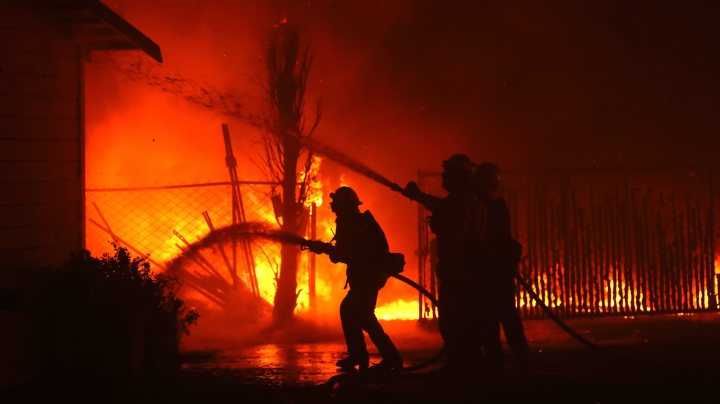This Radio Station in California Is Providing Critical Fire Information in Indigenous Languages

Firefighters battle the Kincade Fire as it burns a barn on October 27, 2019 in Santa Rosa, California. Photo by Justin Sullivan/Getty Images
In California, KBBF-FM, a small radio station in the North Bay, is ensuring Indigenous communities are well informed during one of the most destructive, deadliest wildfire seasons yet.
As the Kincade fire burned through Sonoma County, immigrants and farmworker communities have viewed the small radio station as a vital source of information. Previously providing critical details to Spanish-speakers in the area, radio hosts have extended their efforts to those who speak Indigenous languages like Mixteco and Triqui as well.
The issue of oversight of the language barrier in fire communications arose in 2017. Two years ago, when a large part of California was aflame — the start of a series of particularly devastating fires that have amassed year after year since then — information was provided mostly in English and Spanish. However, considering the state boasts the largest Indigenous population in the country, there were thousands of people who lacked access to details they needed.
That’s where KBBF-FM comes in. In order to bridge that divide, the station is now working with multilingual and knowledgeable volunteers. There’s Xulio Soriano, whose family experienced the effects of the language barrier in 2017, and Maribel Merino, who is able to translate from Spanish to Triqui and also connects people with the UndocuFund, a nonprofit that assists undocumented victims of the fires as they do not qualify for aid from the Federal Emergency Management Agency (FEMA).
“We are creating this out of love, solidarity, but also demanding it as a right,” Soriano told KQED News.
“Most people were just trying to get Spanish information translated, which was an issue,” he continued, recalling his ill mother’s inability to get the context she needed two years ago. “Now we actually have some of the solutions to translate not everything, but as much as we can.”
For them, language access is a necessity — and it’s not a new concept. In its 46 years in operation, KBBF-FM was the first bilingual public radio station in the States and, now, among the first to include Indigenous American languages. As the station refers to themselves, they are the “voice of the community” — and that means they must speak multiple tongues.